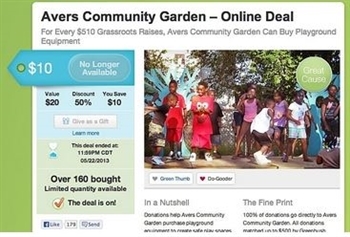
Laura Michel
Avers Community Garden tree house
For our 2013 Annual Luncheon blog series, we're discussing "Accelerating Change"—the theme of this year's Annual Luncheon. Experts from outside and inside MPC will bring their thoughts to the table on how technology is helping our cities meet the challenges and opportunities facing them today and tomorrow.
Sometimes all you need is a reason to tell your story. That was one of the biggest lessons I took away from our 2012 Placemaking contest, the Space in Between, which highlighted the best transformations of vacant or abandoned spaces into community assets. Many entrants to the contests had been working on their projects for years, but hadn’t had an impetus or were too humble to broadcast the results to the world.

Groupon Grassroots helps nonprofits and community groups
raise funds for needed projects.
Crain's Chicago
Last year’s contest changed that; the winner of the public voting phase took home a financial award, so entrants now had a prime reason to trumpet their successes. Technology, they found, was an incredible tool to do so. Email blasts, facebook algorithms and twitter hashtags all came in to play. In addition, winners all received a one-week campaign with Groupon Grassroots, a crowd-sourced funding service that connects individual donors with philanthropic causes. In the case of Avers Community Garden, donations were matched by Greenbush Brewing Company in Sawyer, Mich., and resulted in one set of parallel bars, four chin-up bars, three balance beams and a tree house full of young people on a formerly vacant lot in North Lawndale (as featured in this Aug. 5, 2013 edition of Crain's Chicago Business).
One of the great things about crowd-sourced funding—the best-known vehicle may be Kickstarter—is that while it's about raising money, it also reinforces the Placemaking principle that big ideas do not always require big money. For the Avers project, $10 each from 160 people (and years of small steps forward by committed residents) has completely transformed their block.
The rise of technology and the promising future of Placemaking are no accidental marriage. After all, as Placemaking guru Project for Public Spaces points out, a lack of money is often used as an excuse for doing nothing. Most people do not have access to foundations and corporations to support their ideas, especially in the early stages. Platforms like this allow creative people to build on the networks they do have, and create a track record and following. Technology gives us, in other words, a reason and a way to tell our stories.